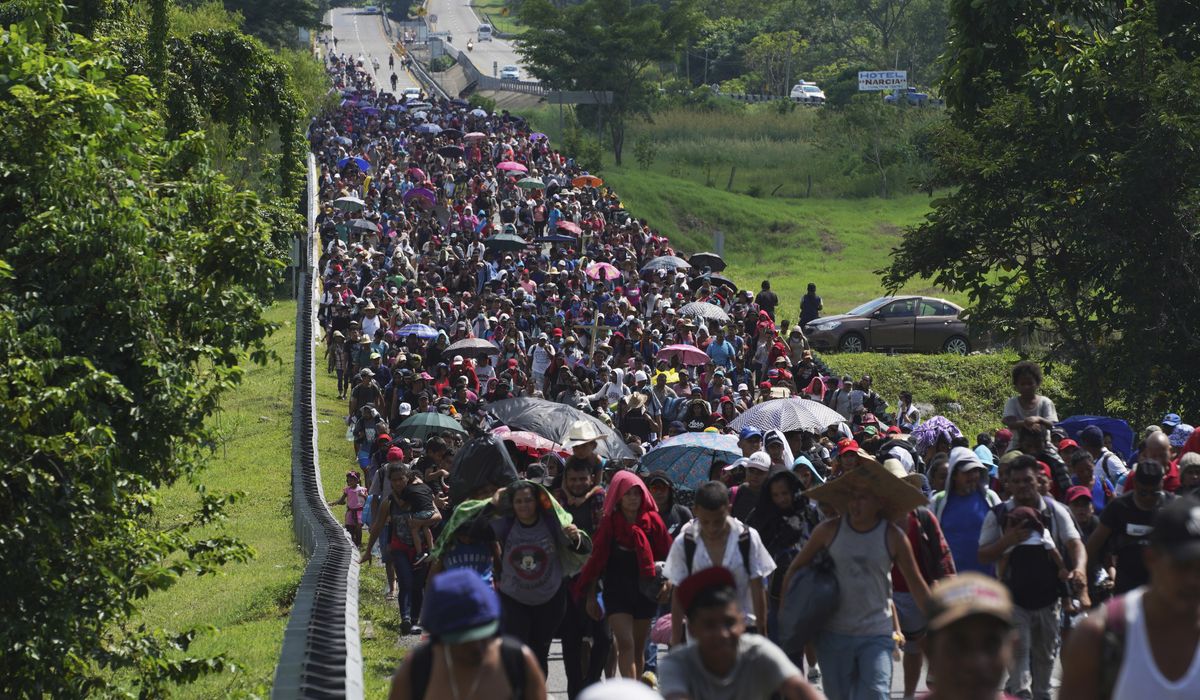
Mexico said Thursday that it will allow the restart of a Trump-era border policy that immediately sends illegal immigrants back across the boundary after the Department of Homeland Security announced it would speed up court hearings, offer vaccinations and help improve conditions for the migrants.
The Biden administration made clear it wasn’t happy about the move and was acting only under a court order to revive the program, officially known as the Migrant Protection Protocols but commonly called the “Remain in Mexico” policy.
The U.S. will begin returning migrants early next week, Homeland Security said.
Instituted by the Trump administration, MPP helped resolve the 2019 border surge by discouraging bogus asylum claims. The Biden administration, calling the program cruel to migrants, halted it on Inauguration Day.
In separate statements Thursday, the two countries outlined the agreement to revive MPP.
Homeland Security said it is making “humanitarian” improvements to the program at Mexico‘s request. It promised to try to finish court cases for those in MPP within six months and to ensure better access to legal assistance from Mexico.
New MPP enrollees will be offered COVID-19 vaccines. Homeland Security said it will pressure Mexico to improve safety at the shelters where MPP enrollees are encouraged to wait.
Given those promises, “for humanitarian reasons and on a temporary basis, the Government of Mexico has decided that it will not return to their home countries certain migrants who have an appointment to appear before an immigration judge in the United States to request asylum there,” the Mexican Foreign Ministry said.
The move angered immigrant rights advocates.
The New York Immigration Coalition said restarting MPP “fundamentally betrays” President Biden’s promises to asylum seekers.
“This president decried the awful human cost of our border policies not long ago. But now, President Biden is doing little to reform and rebuild our current immigration system,” said Murad Awawdeh, the coalition’s executive director.
The American Immigration Council said the administration “has broken its promise” by restoring the MPP and said the program cannot be administered humanely.
“Today is a dark day for the United States and for the rule of law,” said Jorge Loweree, the council’s policy director.
Under MPP, illegal immigrants from beyond Mexico who jumped the border and attempted to make a claim in the U.S. were given notices of court dates and sent back to Mexico to wait.
The goal was to discourage bogus asylum applications that flooded the system when it became clear to migrants in Central America that they could arrive, make a claim and be released into the U.S. They could wait years, and sometimes legally hold jobs, before their cases would be heard.
Immigrant rights advocates said returning people to Mexico blocked some deserving applicants, left them vulnerable to abuse and in some cases denied them the chance to communicate with a lawyer or gain other assistance.
Activists compiled lists of thousands of cases of migrants enrolled in MPP who said they were robbed, beaten, raped or faced other struggles after they were sent back.
The Biden administration halted MPP in its early days, and Homeland Security Secretary Alejandro Mayorkas tried to revoke the program altogether in early June. But a federal judge ruled that Mr. Mayorkas cut too many corners in his decision-making and ordered him to make a “good-faith” effort to revive the program.
Mr. Mayorkas said he intends to cancel MPP and has issued a more detailed memo justifying that decision. The court’s injunction remains, so he is being forced to take steps to revive it.
About 68,000 people were put through the MPP from its 2019 start to its suspension by the Biden administration in January.
Though the number was small relative to the overall border traffic, Trump officials said it sent a message to would-be migrants, and the flow of people slowed.
Mexico agreed to expand the MPP in 2019 under threat of crippling sanctions by President Trump. It deployed tens of thousands of national guard troops along routes used by Central American migrants to choke off the flow farther south.
With other steps to curtail asylum claims, those moves helped resolve the 2019 border surge.
The Biden administration has erased Trump policies, though a pandemic border shutdown known as Title 42 remains in place.
Under Title 42, Mexico generally allows the return of Spanish-speaking single adults and families without children younger than 7.








